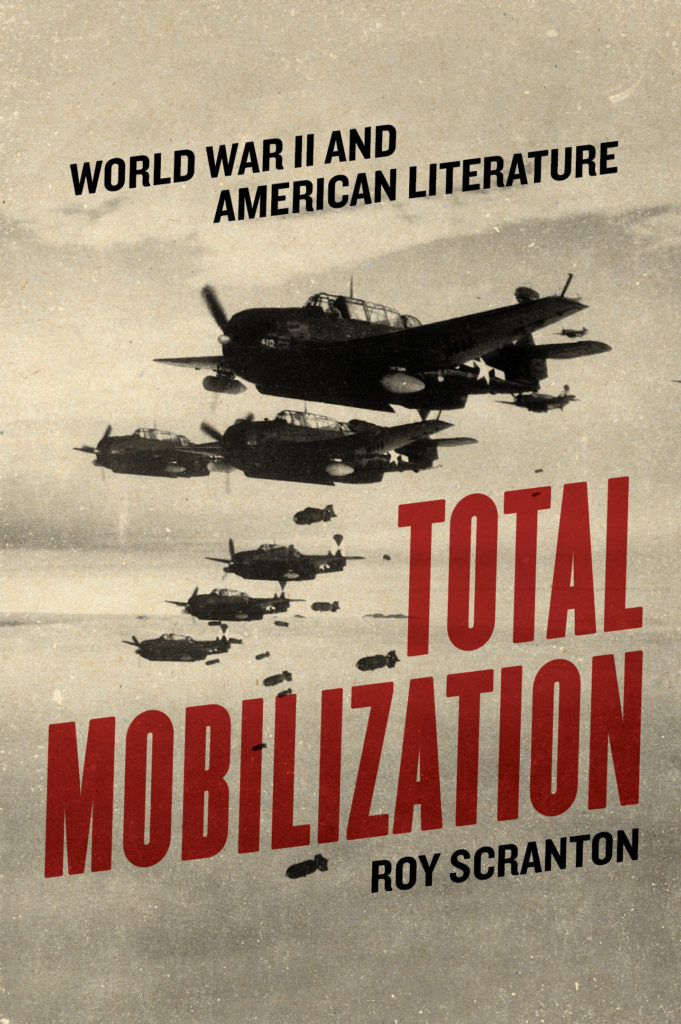
Since World War II, the story of the trauma hero—the noble white man psychologically wounded by his encounter with violence—has become omnipresent in America’s narratives of war, an imaginary solution to the contradictions of American political hegemony. In Total Mobilization, Roy Scranton cuts through the fog of trauma that obscures World War II, uncovering a lost history and reframing the way we talk about war today.
Considering often overlooked works by James Jones, Wallace Stevens, Joan Didion, Ralph Ellison, and others, alongside cartoons and films, Scranton investigates the role of the hero in industrial wartime, showing how such writers struggled to make sense of problems that continue to plague us today: the limits of American power, the dangers of political polarization, and the conflicts between nationalism and liberalism. By turning our attention to the ways we make war meaningful—and by excavating the politics implicit within the myth of the traumatized hero—Total Mobilization revises the way we understand not only World War II, but all of postwar American culture.
Praise for Total Mobilization
“How has something as central to U.S. culture as the figure of the trauma hero escaped critical scrutiny for so long? To say that Scranton’s Total Mobilization answers this question brilliantly even as it fills the void in criticism that inspires it is somehow not enough, because that void is America. A highly compelling and capaciously learned study of the literature of the Second World War, this book also illuminates as never before some of the chaotic depths of self-love, self-pity, and above all rank self-contradiction at the nation’s core. Delivered with unmistakable intellectual authority, and calling us to a confrontation with hard truth, it puts one in mind of classics of Americanist criticism like Richard Slotkin’s Regeneration Through Violence.”
—Mark McGurl, author of The Program Era, Albert Guérard Professor of Literature, Stanford University
“Total Mobilization centers our attention on one iconic figure—the American soldier as trauma hero—and provides a profound and compelling study of the Second World War in American literary history. With remarkable concision, great argumentative tact, and discursive flair, Scranton uses this signal personage to make sense of some of the most shattering paradoxes of the American Century. Never reductive, wonderfully subtle in its formulations and perceptive in its close readings, this is a groundbreaking work of literary criticism and cultural history. It will be part of the permanent legacy of writing about literature and war in the twentieth century.”
—Vincent Sherry, author of The Great War and the Language of Modernism, Howard Nemerov Professor in the Humanities, Washington University in St. Louis
“Tough, plain-spoken, and thorough-going, Scranton harnesses his encyclopedic knowledge of poetry and fiction to argue for the ongoing importance of World War II, a legacy fusing capitalism and nationalism into a toxic crucible for American literature. Against the familiar focus on the traumatized hero-soldier, Scranton highlights total mobilization as the logic of war, a systemic violence that decimates the rest of the world even as it sacrifices unsuspecting US citizens. Deeply troubling and eye-opening.”
—Wai Chee Dimock, author of Through Other Continents: American Literature Across Deep Time, William Lampson Professor of American Studies, Yale University
“The trauma hero: the lone warrior who faces death, returns with unspeakable revelations, and in suffering absolves state and citizen of their complicity in collective violence and wartime atrocities. Scranton has news for us: we’ve been viewing American war through the myth of the trauma hero for so long that we’ve lost sight of the acts, the political logics, and the writings that don’t accord with it. In shaking us loose from that myth, Total Mobilization remakes the literature and legacy of the Second World War. A searching, bracing book.”
—Paul K. Saint-Amour, author of Tense Future: Modernism, Total War, Encyclopedic Form, Walter H. and Leonore C. Annenberg Professor in the Humanities, University of Pennsylvania.
“Scranton’s book asks an urgent question: How can citizens in ‘an industrial commercial republic attempt to manage the conflict of liberal humanist values with the military violence that makes the practice of those values possible.’ With precision and depth, Scranton answers by exploring the ‘the role of the hero in totalized industrial war.’ He exhumes the forgotten traces in poetry, narrative, film and cartoon, emphasizing the manner in which the category of trauma defines our nation’s ethics for what is socially acceptable. Fascinating, articulate, timely and richly archival, the book dissects the ‘ethnonationalist pieties’ embedded in the literature of the ‘good’ Second World War, engaging the fiercely contrasting layers between the real and the symbolic and the manufacture and deployment of the traumatic hero.”
—Lawrence Jackson, author of The Indignant Generation: A Narrative History of African American Writers and Critics, Bloomberg Distinguished Professor of English and History, Johns Hopkins University.